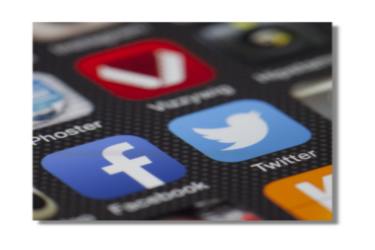



With Elon Musk’s recent acquisition of Twitter, the Supreme Court’s upcoming rulings on two cases (Gonzalez v. Google and Twitter v. Taameh) related to online content, and continuing concerns about the effects of online interactions on the mental health of teenagers in the news, questions about the role of social media in our lives have never been more salient. These questions exist at both the micro-level of personal decisions and interactions and the macro-level of society, politics, and democracy. Should we be on social media? Should we regulate it? If so, how and to what extent? Some argue that social media is generally positive for both individuals and society, while others assert that its harms far outweigh its benefits – at least as it currently operates.
To explore these questions, Davidson College’s Deliberative Citizenship Initiative, Digital Studies, Political Science, and Psychology Departments, and Jay Hurt Hub for Innovation and Entrepreneurship invite you to join us for a Deliberative Forum on “Social Media: How Should We Engage and/or Regulate it, If at All?” This Deliberative Forum will enable participants to actively engage with this important issue, first by hearing from an online panel of experts with diverse perspectives on the topic, and then by actively deliberating with one another in facilitated small group discussions (either in person or virtually) on how best to engage with and regulate social media (if at all). This is a fantastic opportunity to learn from experts, listen to the viewpoints of others, and share your own ideas about this challenging and complex topic.
The event is free but registration is required. We request that all registrants plan to attend both the panel and the small group discussions, which are designed to complement each other. Participants may join both in-person and online. Spaces are limited due to the number of trained DCI facilitators we have available to moderate the small group discussions. You may be placed on a waitlist if our capacity is reached; we will let you know if spaces open up. We will do our best to accommodate as many people as we can so please don’t hesitate to get on the waitlist. The Zoom link will be sent to online participants after they register.
Emily Dreyfuss is a journalist who covers the impacts of technology on society, with a focus on social media and information systems. She was a 2018 Nieman Berkman Klein fellow, a senior editor at WIRED and CNET, and a founding editor of the tech news website Protocol. Ms. Dreyfuss is currently Senior Editor and Research Fellow at the Harvard Kennedy School’s Technology and Social Change Project, where she co-leads the Harvard Shorenstein News Leaders Program and edits the Media Manipulation Casebook, a research platform that advances knowledge of misinformation and its threats to democracy, public health, and security. Ms. Dreyfuss is also a co-author of the 2022 book, Meme Wars: The Untold Story of the Online Battles Upending Democracy in America.
Melissa Hunt is the Associate Director of Clinical Training in the Department of Psychology at the University of Pennsylvania, where she also earned her PhD in psychology. Dr. Hunt conducts ongoing research on the cognitive and affective bases of depression, anxiety, and chronic gastrointestinal disorders, and has published two books on these topics for both patients and clinicians. In 2018, Dr. Hunt published the first experimental study on Facebook, Snapchat, and Instagram use, and found a causal link between time spent on these platforms and increased loneliness and depression. The study, “No More FOMO: Limiting Social Media Decreases Loneliness and Depression,” was published in the Journal of Social and Clinical Psychology and has been cited over 700 times.
Darius Kazemi is an internet artist and researcher who has been working on federated, decentralized social media since his Mozilla Open Web Fellowship in 2018. He maintains several federated social media software projects including Hometown, and published Run Your Own Social, a guide to hosting a small social media site for your friends. He is a Senior Software Engineer at Meedan where he works on Check, a software tool for content moderators and fact-checkers. He has been interviewed by The Wall Street Journal and The New York Times about the difficulty of identifying bot accounts on social media, and The Boston Globe has described him as “one of the most closely watched and pioneering figures at the intersection of technology, cultural commentary, and what feels to many like a new kind of Web-native art.”
Jacob Mchangama is CEO of the think tank Justitia, directs the organization´s Future of Free Speech Project, . Jacob, and was recently appointed as a Research Professor at Vanderbilt University. He has written and commented extensively on free speech, technology, and human rights in international media outlets, including the Economist, L.A. Times, Washington Post, BBC, CBS News, NPR, CNN, Foreign Affairs, Foreign Policy, Politico and Wall Street Journal as well as top-tier academic and peer-reviewed journals. Jacob is the producer and narrator of the podcast “Clear and Present” Danger: A History of Free Speech and author of the critically acclaimed book Free Speech: A History From Socrates to Social Media, published by Basic Books in 2022.
Mark Sample, Chair and Professor of Digital Studies at Davidson College, will serve as the moderator of the panel.